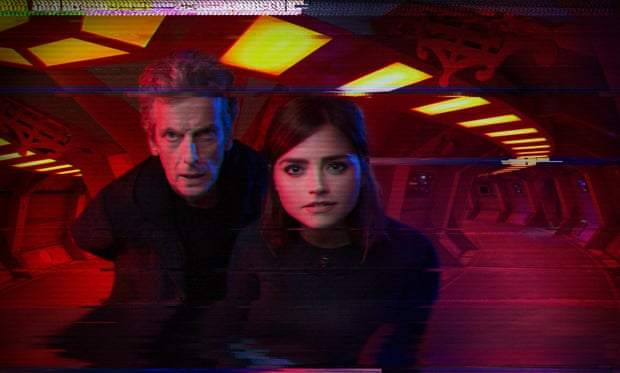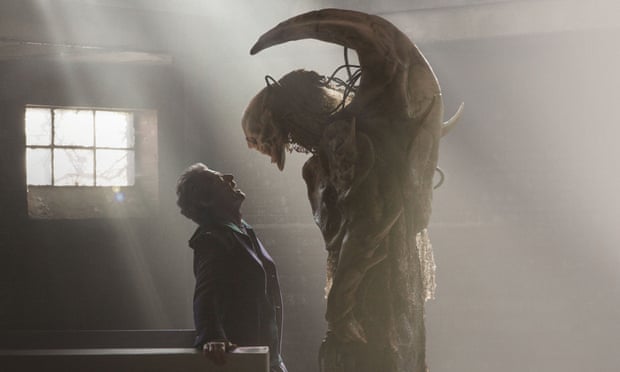It's the series finale, and the Doctor isn't as we know him best. Having lost his best friend and being trapped inside the confession dial for over 4 billion years, he's not in a mood that should be challenged. After realising his own people, the Time Lords, where being all his suffering, the Doctor sets out to reclaim his own planet from the corrupt, even if it means breaking all the moral codes he lives by...
After announcing his arrival, the Doctor returns to his childhood home, awaiting an audience with President Rassilon (Donald Sumpter). Once Rassilon eventually appears complete with armed guards and the General (Ken Bones), the Doctor wins them all over to his side (apart from Rassilon, whom he banishes). Not wanting to stop there, he changes an established point in history, by rescuing Clara from her death in Face the Raven. Now on the run, from the Time Lords, the Doctor must find a way to ensure Clara never has to die, and discover the truth about the mythical Hybrid.
So after a series long build up, does it all pay off in this final episode? I believe it does, as we not only get answers to the questions poised by earlier episodes, but we also see a change to the characters. Namely, the biggest character change is the Doctor, as he is at his moodiest since the Christopher Eccleston series exactly ten years ago. He is not in a forgiving kind of mood, and there is also an uneasy calmness about him to start with, as he barley says a word to convince the other Time Lords to revolt against Rassilon. Clara is unexpectedly handed a large role in this episode, with her being removed from her timeline so that the Doctor can keep her alive. I thought Face the Raven was a strong enough send off to her character, but her appearance here is still more than welcome. Maisie Williams also returns at the end of the episode, with her aiding in the explanation of what exactly the Hybrid is. Since Ashildr's introduction, this idea of the Hybrid has been a luring threat, but never did the Doctor expect for it to be directly liked to himself and Clara. The Hybrid is revealed to be the result of the Doctor and Clara's friendship, and the threat comes from the Doctor's new found ruthlessness after her death. I thought this was a clever and satisfying reveal, and one that I wasn't expecting, as it turns out Ashildr was merely a ruse.
Being that the episode takes place on the rarely featured planet of Gallifrey, there are plenty of little surprise for fans to enjoy. The most obvious, of course, is the return of the original TARDIS design from the 1960's, complete with the original sounds from the classic series. Since the Doctor has always been played by white male actors, many people have wondered whether it is possible for Time Lords to change gender and/or race. With the Master being reintroduced as the female Missy last series, Hell Bent gives us the answer to the other half of the thought. The General is shown regenerating into a younger black woman, the first time in the shows history that both a gender and race change has been depicted.
So with the Doctor now travelling alone, he sets off for new adventures starting Christmas day. As promised, here is my list of overall pros and cons for this latest series of Doctor Who:
Pros:
+ The Doctor and Clara's relationship - an obvious choice, but there have been some pretty naff Doctor/companion pairings in the past. The Twelfth Doctor and Clara have really gelled perfectly this series, and the performances of both Capaldi and Coleman have been a joy to watch.
+ Regular two-part stories - In the classic series, each story consisted of at least two episodes, and having that format return has aided this season's stories to become better paced.
+ Story arc - a staple of Doctor Who since 2005, this year's arc has been one of the most intriguing, with a satisfying pay-off to boot.
+ Fresh ideas - though not all of them have worked (Sleep No More), this series has had a much stronger line of stories. Largely, that's down to the two-part format, but stories such as finale have explored the complexities of the central characters more than the last series ever did.
Cons:
- The Girl Who Died - definitely the weak point of the series, with it clashing against the fresh ideas of other episodes, due to its recycled plot of a village under attack.
- Some weak supporting characters - namely the characters from the Under the Lake story and Sleep No More. They were either killed off without any prior character development, or suddenly revealed hidden feelings never at all hinted at.
This concludes my look at Doctor Who series nine. Some individual pieces I've written haven't been my best, partly due to my course workload being my priority. Nevertheless, I have very much enjoyed writing about this series, and to those who have followed my posts weekly: thank you very much for your interest and support!
So after a series long build up, does it all pay off in this final episode? I believe it does, as we not only get answers to the questions poised by earlier episodes, but we also see a change to the characters. Namely, the biggest character change is the Doctor, as he is at his moodiest since the Christopher Eccleston series exactly ten years ago. He is not in a forgiving kind of mood, and there is also an uneasy calmness about him to start with, as he barley says a word to convince the other Time Lords to revolt against Rassilon. Clara is unexpectedly handed a large role in this episode, with her being removed from her timeline so that the Doctor can keep her alive. I thought Face the Raven was a strong enough send off to her character, but her appearance here is still more than welcome. Maisie Williams also returns at the end of the episode, with her aiding in the explanation of what exactly the Hybrid is. Since Ashildr's introduction, this idea of the Hybrid has been a luring threat, but never did the Doctor expect for it to be directly liked to himself and Clara. The Hybrid is revealed to be the result of the Doctor and Clara's friendship, and the threat comes from the Doctor's new found ruthlessness after her death. I thought this was a clever and satisfying reveal, and one that I wasn't expecting, as it turns out Ashildr was merely a ruse.
Being that the episode takes place on the rarely featured planet of Gallifrey, there are plenty of little surprise for fans to enjoy. The most obvious, of course, is the return of the original TARDIS design from the 1960's, complete with the original sounds from the classic series. Since the Doctor has always been played by white male actors, many people have wondered whether it is possible for Time Lords to change gender and/or race. With the Master being reintroduced as the female Missy last series, Hell Bent gives us the answer to the other half of the thought. The General is shown regenerating into a younger black woman, the first time in the shows history that both a gender and race change has been depicted.
So with the Doctor now travelling alone, he sets off for new adventures starting Christmas day. As promised, here is my list of overall pros and cons for this latest series of Doctor Who:
Pros:
+ The Doctor and Clara's relationship - an obvious choice, but there have been some pretty naff Doctor/companion pairings in the past. The Twelfth Doctor and Clara have really gelled perfectly this series, and the performances of both Capaldi and Coleman have been a joy to watch.
+ Regular two-part stories - In the classic series, each story consisted of at least two episodes, and having that format return has aided this season's stories to become better paced.
+ Story arc - a staple of Doctor Who since 2005, this year's arc has been one of the most intriguing, with a satisfying pay-off to boot.
+ Fresh ideas - though not all of them have worked (Sleep No More), this series has had a much stronger line of stories. Largely, that's down to the two-part format, but stories such as finale have explored the complexities of the central characters more than the last series ever did.
Cons:
- The Girl Who Died - definitely the weak point of the series, with it clashing against the fresh ideas of other episodes, due to its recycled plot of a village under attack.
- Some weak supporting characters - namely the characters from the Under the Lake story and Sleep No More. They were either killed off without any prior character development, or suddenly revealed hidden feelings never at all hinted at.
This concludes my look at Doctor Who series nine. Some individual pieces I've written haven't been my best, partly due to my course workload being my priority. Nevertheless, I have very much enjoyed writing about this series, and to those who have followed my posts weekly: thank you very much for your interest and support!



